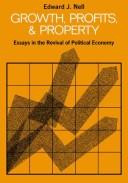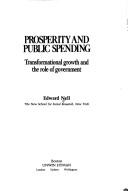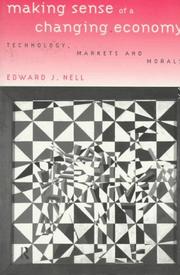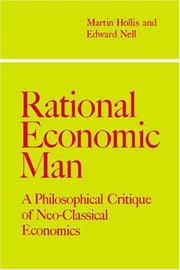| Listing 1 - 10 of 10 |
Sort by
|

ISBN: 0521223962 0521319188 051157178X 0511865813 9780521223966 9780511571787 9780521319188 Year: 1980 Publisher: Cambridge: Cambridge university press,
Abstract | Keywords | Export | Availability | Bookmark
 Loading...
Loading...Choose an application
- Reference Manager
- EndNote
- RefWorks (Direct export to RefWorks)
This collection of essays is designed to illustrate the variety, complexity and power of non-neoclassical economic thinking. The essays define the fundamental questions differently, employ different analytical tools and arrive at different conclusions. The two strands of non-neoclassical thinking that occupy most of the book are the neo-Keynesian and the neo-Marxian. The bulk of the book is composed of essays on microeconomics, macroeconomics, trade, comparative systems and welfare, with an unusual section on property rights and social hierarchy.
Economics --- Economics. --- 330.1 --- 338.22 --- 330.35 --- -Economic theory --- Political economy --- Social sciences --- Economic man --- Economische grondbegrippen. Algemene begrippen in de economie --- Economische organisatieleer. Economisch beleid. Economische politiek --- Economische groei. Kwantitatieve toename. Technische vooruitgang --zie ook {338.09} --- Addresses, essays, lectures --- -Economische grondbegrippen. Algemene begrippen in de economie --- 330.35 Economische groei. Kwantitatieve toename. Technische vooruitgang --zie ook {338.09} --- 338.22 Economische organisatieleer. Economisch beleid. Economische politiek --- 330.1 Economische grondbegrippen. Algemene begrippen in de economie --- -338.22 Economische organisatieleer. Economisch beleid. Economische politiek --- Economic theory --- Business, Economy and Management --- Political science. --- Administration --- Civil government --- Commonwealth, The --- Government --- Political theory --- Political thought --- Politics --- Science, Political --- State, The
Book
ISBN: 0043303390 0043303404 9780043303399 9780043303405 Year: 1984 Publisher: London: Allen and Unwin,
Abstract | Keywords | Export | Availability | Bookmark
 Loading...
Loading...Choose an application
- Reference Manager
- EndNote
- RefWorks (Direct export to RefWorks)
Economic order --- Free enterprise. --- Supply-side economics. --- Chicago school of economics. --- Rational expectations (Economic theory) --- United States --- Great Britain --- Chile --- Economic policy --- Economic policy. --- United States - Economic policy - 1981-1993. --- Great Britain - Economic policy - 1979-1997. --- Chile - Economic policy.

ISBN: 0043390447 0043390455 9780043390443 9780043390450 Year: 1988 Publisher: Boston: Unwin Hyman,
Abstract | Keywords | Export | Availability | Bookmark
 Loading...
Loading...Choose an application
- Reference Manager
- EndNote
- RefWorks (Direct export to RefWorks)

ISBN: 0415136407 0415136393 9786610150953 1299285759 1134777531 0203980239 1280150955 9780203980231 6610150958 9780415136402 9781134777488 9781134777525 9781134777532 9780415136396 1134777523 9781299285750 9781280150951 Year: 1996 Publisher: London: Routledge,
Abstract | Keywords | Export | Availability | Bookmark
 Loading...
Loading...Choose an application
- Reference Manager
- EndNote
- RefWorks (Direct export to RefWorks)
This text presents an unorthodox view of the current state of economic theory and policies. Deriding the general trend for "econobabble", the author explains the reason why conventional wisdom in economics now seems irrelevant and looks to likely future scenarios.
Economic order --- economie --- Capitalism --- Consumption (Economics) --- Individualism. --- Moral and ethical aspects. --- Capitalism - Moral and ethical aspects. --- Consumption (Economics). --- Business. --- Individualism --- Business & Economics --- Economic Theory --- Moral and ethical aspects --- 241.67 --- Business ethics. Corporate ethics. Bedrijfscodes. Management en ethiek. Zakenmoraal --- 241.67 Business ethics. Corporate ethics. Bedrijfscodes. Management en ethiek. Zakenmoraal --- Consumer demand --- Consumer spending --- Consumerism --- Spending, Consumer --- Economics --- Equality --- Political science --- Self-interest --- Sociology --- Libertarianism --- Personalism --- Persons --- Demand (Economic theory)

ISBN: 052159006X 0521023599 0511571798 9780521590068 9780511571794 9780521023597 Year: 1998 Publisher: Cambridge: New York: Cambridge university press,
Abstract | Keywords | Export | Availability | Bookmark
 Loading...
Loading...Choose an application
- Reference Manager
- EndNote
- RefWorks (Direct export to RefWorks)
For the last century, economic analysis has been wedded to the idea of equilibrium, in spite of the evident fact that most economic relationships are in flux. The theory of transformational growth in this work replaces equilibrium with history. The role of the market is not to allocate resources, but to generate innovations, which are 'selected' by competition in an evolutionary process. These innovations in turn change the way markets work and how they adjust, thus creating new problems and new kinds of pressures to innovate. Different historical periods can be distinguished with a new one perhaps on the horizon. In each a distinctive style of technology prevails, associated with corresponding institutions and patterns of market behavior. The core relationships provide the foundations for a theory of monetary circulation, which makes possible a revised Keynesian approach, based on Classical foundations.
Keynesian economics --- Economic development --- AA / International- internationaal --- 305.3 --- 331.00 --- 338.8 --- 331.01 --- 331.04 --- 338.043 --- 338.00 --- 330.156 --- Development, Economic --- Economic growth --- Growth, Economic --- Economic policy --- Economics --- Statics and dynamics (Social sciences) --- Development economics --- Resource curse --- Post-Keynesian economics --- Schools of economics --- Econometrie van de productiefuncties en van het gebruik van de capaciteiten (Cobb-Douglas functie) Econometrie van de groei. --- Economische bewegingen: algemeenheden. --- Economische groei. --- Evolutie van de economische cycli. --- Langdurige bewegingen. --- Technologische vooruitgang. Automatisering. Computers. Werkgelegenheid en informatica. --- Theorie van de productie. --- Econometrie van de productiefuncties en van het gebruik van de capaciteiten (Cobb-Douglas functie) Econometrie van de groei --- Economische bewegingen: algemeenheden --- Evolutie van de economische cycli --- Langdurige bewegingen --- Theorie van de productie --- Technologische vooruitgang. Automatisering. Computers. Werkgelegenheid en informatica --- Economische groei --- Business, Economy and Management --- Keynesian economics. --- Economic development. --- Keynésianisme. --- Développement économique.
Book
ISBN: 0333494733 9780333494738 Year: 1991 Publisher: Houndmills, Basingstoke, Hampshire: MacMillan,
Abstract | Keywords | Export | Availability | Bookmark
 Loading...
Loading...Choose an application
- Reference Manager
- EndNote
- RefWorks (Direct export to RefWorks)
Kaldor, Nicholas --- Economics. --- Kaldor, Nicholas, --- AA / International- internationaal --- 08 --- 331.31 --- 330.00 --- 338.8 --- Biografieën en memoires. --- Economisch beleid. --- Economische en sociale theorieën: algemeenheden. --- Economische groei. --- Economics --- Biografieën en memoires --- Economisch beleid --- Economische en sociale theorieën: algemeenheden --- Economische groei --- Kaldor, Nicholas, - 1908-1986

ISBN: 0521204089 0521033888 0511554559 9780521204088 9780511554551 9780521033886 Year: 1978 Publisher: Cambridge: Cambridge university press,
Abstract | Keywords | Export | Availability | Bookmark
 Loading...
Loading...Choose an application
- Reference Manager
- EndNote
- RefWorks (Direct export to RefWorks)
Economics is probably the most subtle, precise and powerful of the social sciences and its theories have deep philosophical import. Yet the dominant alliance between economics and philosophy has long been cheerfully simple. This is the textbook alliance of neo-Classicism and Positivism, so crucial to the defence of orthodox economics against by now familiar objections. This is an unusual book and a deliberately controversial one. The authors cast doubt on assumptions which neo-Classicists often find too obvious to defend or, indeed, to mention. They set out to disturb an influential concensus and to champion an unpopular cause. Although they go deeper into both philosophy and economics than is usual in interdisciplinary works, they start from first principles and the text is provokingly clear. This will be a stimulating book for all economic theorists and philosophers interested in the philosophy of science and social science.
Economic man. --- Neoclassical school of economics. --- Rationalism. --- Economic man --- Neoclassical school of economics --- Rationalism --- 330.81 --- Knowledge, Theory of --- Religion --- Belief and doubt --- Deism --- Free thought --- Realism --- Homo oeconomicus --- Human beings --- Economics --- Self-interest --- 330.81 Voorlopers van Adam Smith. Mercantilisme. Colbertisme. Fysiocraten. Kameralisme --(economisch denken) --- Voorlopers van Adam Smith. Mercantilisme. Colbertisme. Fysiocraten. Kameralisme --(economisch denken) --- Cambridge school of economics --- Marshallian economics --- Classical school of economics --- Schools of economics --- Philosophy of science --- Ecole néo-classique d'économie politique --- Rationalisme --- Arts and Humanities --- Philosophy
Book
ISBN: 0333566955 9780333566954 Year: 1995 Publisher: Basingstoke: MacMillan,
Abstract | Keywords | Export | Availability | Bookmark
 Loading...
Loading...Choose an application
- Reference Manager
- EndNote
- RefWorks (Direct export to RefWorks)
AA / International- internationaal --- 333.80 --- 333.111.40 --- 333.400 --- 333.405 --- 333.403 --- 333.404 --- Geld-, bank- en kredietpolitiek. Kapitaalmarkt en -rente: algemeenheden. --- Gelduitgifte en gelddekking: algemeen. --- Geldwezen: algemeenheden. --- Monetaire stromen. --- Monetaire theorieën. Kwantitatieve theorie. Theorie van de incasso's. Optiek van de uitgaven en inkomens. --- Omloopsnelheid van het geld. Ont-en oppotting. --- Money --- Keynesian economics --- Geld-, bank- en kredietpolitiek. Kapitaalmarkt en -rente: algemeenheden --- Gelduitgifte en gelddekking: algemeen --- Geldwezen: algemeenheden --- Monetaire stromen --- Monetaire theorieën. Kwantitatieve theorie. Theorie van de incasso's. Optiek van de uitgaven en inkomens --- Omloopsnelheid van het geld. Ont-en oppotting
Multi
ISBN: 0521208882 0521125332 0511898320 9780521208888 9780521125338 9780511898327 Year: 1976 Publisher: Cambridge: Cambridge university press,
Abstract | Keywords | Export | Availability | Bookmark
 Loading...
Loading...Choose an application
- Reference Manager
- EndNote
- RefWorks (Direct export to RefWorks)
The writings on the theory of economic growth share almost without exception two characteristics - they deal exclusively with steady growth or equilibrium dynamics, and they try to predict the actual course of long-term development on the basis of greatly oversimplified behaviour assumptions. This book, first published in 1976, studies the many variants of a disequilibrium path, which growth processes pursue under the impact of major growth stimuli - changes in labour supply, in natural resources, and in technology. The study gives direction to public policies, sharply distinguishing between the requirements of market economies and of planned systems.
Economic growth --- Economic development --- Industrialization --- Mathematical models --- AA / International- internationaal --- 338.8 --- With an appendix by Edward J. Nell. --- -Industrialization --- -Industrial development --- Economic policy --- Deindustrialization --- Development, Economic --- Growth, Economic --- Economics --- Statics and dynamics (Social sciences) --- Development economics --- Resource curse --- Economische groei. --- -Economische groei. --- With an appendix by Edward J. Nell --- Industrial development --- Growth models (Economics) --- Economische groei --- Business, Economy and Management --- Economic development - Mathematical models --- Industrialization - Mathematical models --- Economic development. --- Industrialization. --- Mathematical models.
Book

ISBN: 289105945X 9782891059459 Year: 2006 Publisher: Montréal: Gaëtan Morin,
Abstract | Keywords | Export | Availability | Bookmark
 Loading...
Loading...Choose an application
- Reference Manager
- EndNote
- RefWorks (Direct export to RefWorks)
| Listing 1 - 10 of 10 |
Sort by
|

 Search
Search Feedback
Feedback About UniCat
About UniCat  Help
Help News
News